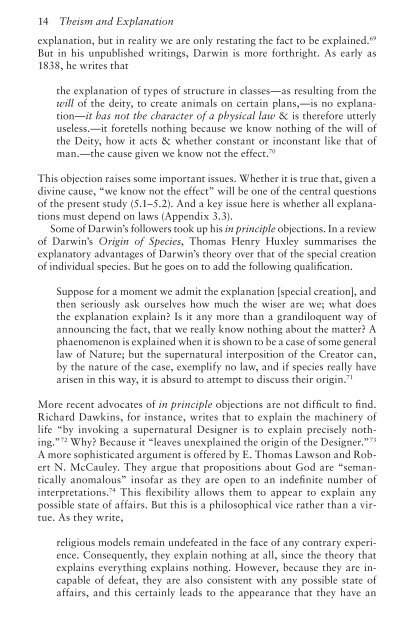Theism and Explanation - Appeared-to-Blogly
Theism and Explanation - Appeared-to-Blogly
Theism and Explanation - Appeared-to-Blogly
Create successful ePaper yourself
Turn your PDF publications into a flip-book with our unique Google optimized e-Paper software.
14 <strong>Theism</strong> <strong>and</strong> <strong>Explanation</strong><br />
explanation, but in reality we are only restating the fact <strong>to</strong> be explained. 69<br />
But in his unpublished writings, Darwin is more forthright. As early as<br />
1838, he writes that<br />
the explanation of types of structure in classes—as resulting from the<br />
will of the deity, <strong>to</strong> create animals on certain plans,—is no explanation—it<br />
has not the character of a physical law & is therefore utterly<br />
useless.—it foretells nothing because we know nothing of the will of<br />
the Deity, how it acts & whether constant or inconstant like that of<br />
man.—the cause given we know not the effect. 70<br />
This objection raises some important issues. Whether it is true that, given a<br />
divine cause, “we know not the effect” will be one of the central questions<br />
of the present study (5.1–5.2). And a key issue here is whether all explanations<br />
must depend on laws (Appendix 3.3).<br />
Some of Darwin’s followers <strong>to</strong>ok up his in principle objections. In a review<br />
of Darwin’s Origin of Species, Thomas Henry Huxley summarises the<br />
explana<strong>to</strong>ry advantages of Darwin’s theory over that of the special creation<br />
of individual species. But he goes on <strong>to</strong> add the following qualifi cation.<br />
Suppose for a moment we admit the explanation [special creation], <strong>and</strong><br />
then seriously ask ourselves how much the wiser are we; what does<br />
the explanation explain? Is it any more than a gr<strong>and</strong>iloquent way of<br />
announcing the fact, that we really know nothing about the matter? A<br />
phaenomenon is explained when it is shown <strong>to</strong> be a case of some general<br />
law of Nature; but the supernatural interpos ition of the Crea<strong>to</strong>r can,<br />
by the nature of the case, exemplify no law, <strong>and</strong> if species really have<br />
arisen in this way, it is absurd <strong>to</strong> attempt <strong>to</strong> discuss their origin. 71<br />
More recent advocates of in principle objections are not diffi cult <strong>to</strong> fi nd.<br />
Richard Dawkins, for instance, writes that <strong>to</strong> explain the machinery of<br />
life “by invoking a supernatural Designer is <strong>to</strong> explain precisely nothing.”<br />
72 Why? Because it “leaves unexplained the origin of the Designer.” 73<br />
A more sophisticated argument is offered by E. Thomas Lawson <strong>and</strong> Robert<br />
N. McCauley. They argue that propositions about God are “semantically<br />
anomalous” insofar as they are open <strong>to</strong> an indefi nite number of<br />
interpretations. 74 This fl exibility allows them <strong>to</strong> appear <strong>to</strong> explain any<br />
possible state of affairs. But this is a philosophical vice rather than a virtue.<br />
As they write,<br />
religious models remain undefeated in the face of any contrary experience.<br />
Consequently, they explain nothing at all, since the theory that<br />
explains everything explains nothing. However, because they are incapable<br />
of defeat, they are also consistent with any possible state of<br />
affairs, <strong>and</strong> this certainly leads <strong>to</strong> the appearance that they have an



